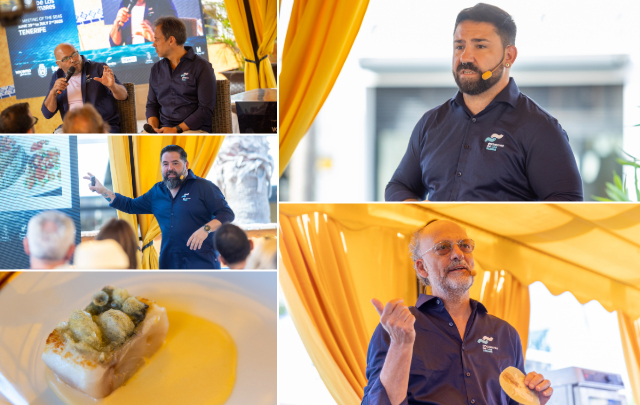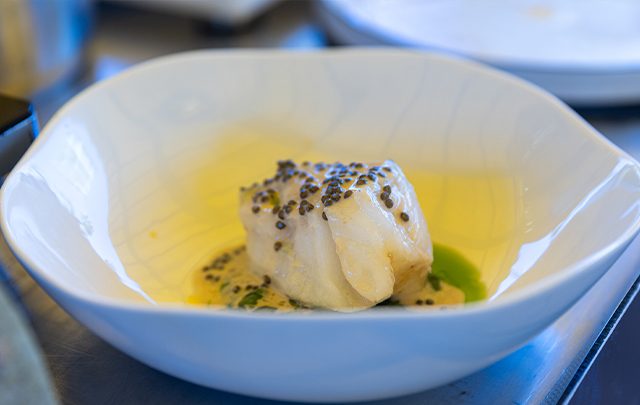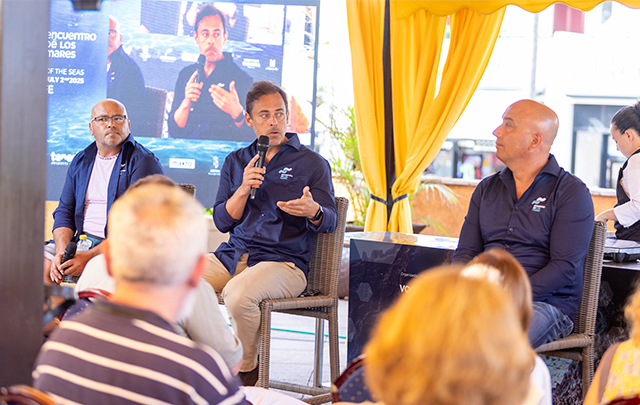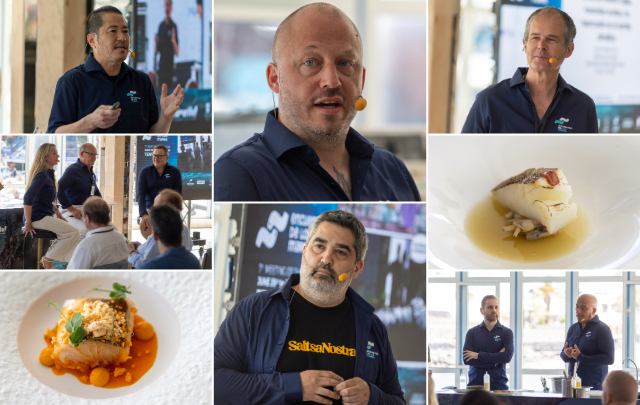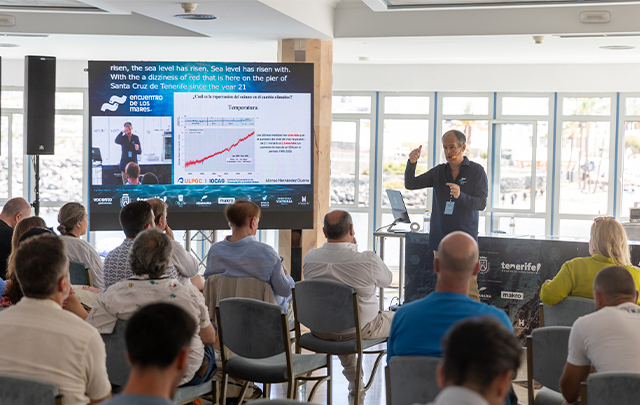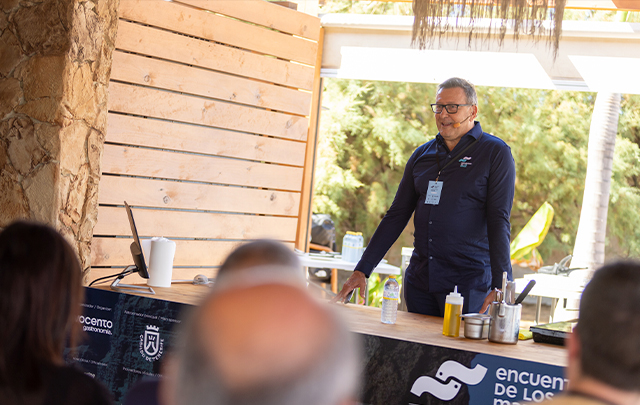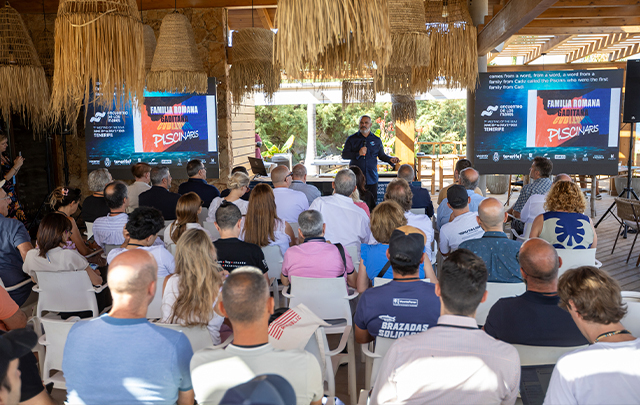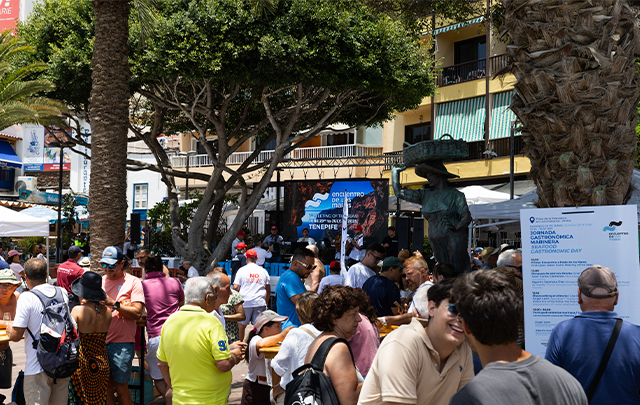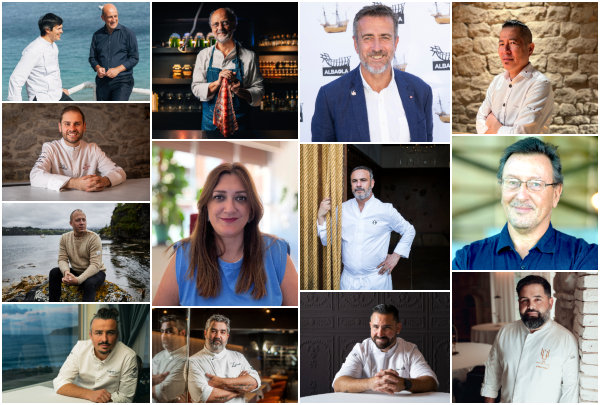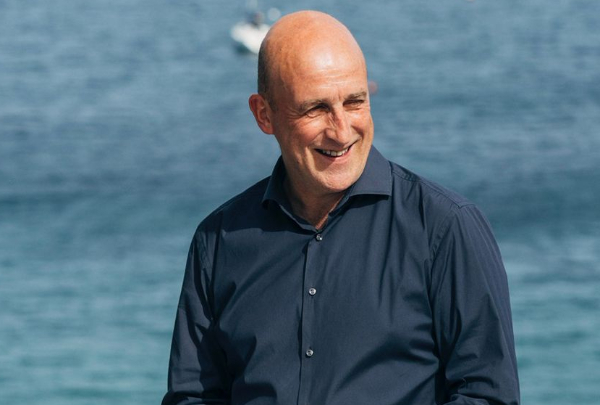News
Ángel León has announced that he will be moving Aponiente to the marshland next to the restaurant, where he will be working with his own fish.
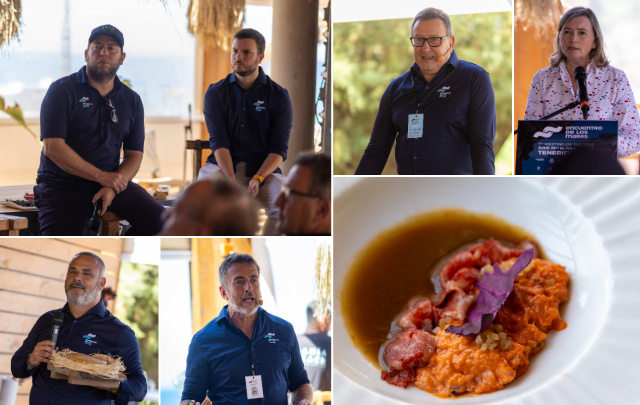
The seventh edition of the Meeting of the Seas began with all participants unanimously declaring the need to ‘continue studying and investing in the marine world’. The event aims to highlight the importance of salt as a vital component of the oceans, as well as its role as an ingredient, symbol and cultural link between humans and the sea. This statement was echoed by many on the opening day of the event, which was promoted by the Cabildo de Tenerife through its Tourism and Primary Sector departments and organised by Vocento Gastronomía. The event took place on the beachfront at Bahía Beach in Arona, Tenerife. Just as the ocean and the land converge on the coast of this Canary Island, Benjamín Lana, Vocento Gastronomía's managing director, recalled that Encuentro de los Mares also fosters a 'communion between science and gastronomy, as well as a responsible fishing industry'. This synergy has been evident throughout the conference's seven editions, demonstrating that, just as 'cooking requires genuine knowledge', 'science can benefit from someone who amplifies its voice further afield', a role that gastronomy can fulfil exceptionally well given its current influence beyond the culinary realm. Dimple Melwani, the CEO of Tenerife Tourism, echoed this vision of teamwork, adding that 'this event reflects our commitment to a sustainable tourism model where the sea, cuisine and our traditions intertwine to offer authentic experiences that enrich both our visitors and our local communities'.
The morning began with a story about a unique new experience from Ángel León, a chef from Cádiz (Aponiente***, Puerto de Santa María). Known as the 'Chef of the Sea', he presented his new construction project: a 3.0 estuary with 5-metre-deep channels that will create more currents and encourage the proliferation of species in the 20 hectares of marshland surrounding his restaurant. "We have had the concession for seven months," explained the chef, "and we are finally going to be able to develop ideas such as cultivating sea grass and sea soybeans." 'Reclaiming this marshland takes me out of my comfort zone,' León admitted. 'I felt I was in a boring period, but the marshland has reignited my enthusiasm.' There are still three weeks of work left before Aponiente's customers can stroll through the marsh. The intention is to film it from October to February, with the aim of having it fully operational by March.
Meeting of the Seas has discussed the twinning of the waters of latitude 36 3 of the Cádiz marshes with those of latitude 43 2. Cádiz and Guipuzcoa: Catarina and Elkano. Pablo Vicari and Aitor Arregi. The two chefs recounted the culinary and educational journey involved in bringing Elkano's philosophy (Guetaria) to their restaurant in Santi Petri, Cataria. "The sea unites us all," said Aitor Arregi, explaining the significance of his return journey, which began with his Andalusian adventure. The Basque chef assured us that, although the fire is the same, the result is not, because 'the dish is nothing more than a description of a territory and inherited knowledge', and it is the environment that defines this. Vicari added that, to get to know this environment, 'it was necessary to find someone from the area who could show us its reality.' They found that person in the Cádiz fisherman Emilio Marín, who joined them on stage to share his knowledge of new Basque culinary products, such as sea anemones, moray eels and scallops. “The sailor is the first chef,” said Aitor Arregi, emphasising the importance of listening to them, a sentiment echoed by Pablo Vicari, who acknowledged that “Cataria would not make sense if we couldn't learn.”
The waters of the Atlantic also permeate the cuisine of another chef who took to the stage today at Meeting of the Seas: the Portuguese chef Gil Fernandes, who runs the restaurant Fortaleza do Guincho* in Cascais. Fernandes gave a masterclass on using seaweed in gastronomy. In his opinion, seaweed 'has a lot to offer', and we must explore it and use our creativity to develop new seaweed-based recipes. Fernandes bases his cooking on the traditional cuisine of his grandparents and advocates using 'seasonal seaweed' as a substitute for salt: 'Seaweed is a way of using salt without using it; seaweed has its own salt'.
Rediscovering salt
We learned from Carlos Duarte, the scientific director of the conference and Professor of Marine Sciences at King Abdullah University of Science and Technology (KAUST) in Saudi Arabia, that 'salt is being rediscovered as a valuable material, as it was in ancient times, with many applications'. In his presentation, he focused on this renaissance of sea salt, highlighting its multiple benefits for human health, such as its positive effects on respiratory health and digestion, and its ability to prevent excess cholesterol. He also discussed the benefits of bathing in salt or hypersaline water for atopic skin. Amidst this 'avalanche of interest in salt', Duarte also discussed other applications, such as energy storage and grid stabilisation, as well as emerging uses for improving the production of hydrogen and the extraction of lithium from seawater — an important metal for the energy transition.
Meeting of the Seas continued to explore its scientific side with Xabier Irigoien, a research professor at Ikerbasque. He took the audience on a journey to the depths of the ocean to learn about mesopelagic fish, which live in the water column where there is enough light to see, but not enough for algae to grow. Irigoien stated that these fish are still largely unknown and underestimated, and that their numbers are unknown. This situation is being addressed, as these fish play a vital role in CO₂ capture: they rise to the surface every day to feed, and then descend to the depths where CO₂ is retained. It is estimated that around 5 billion tonnes of these fish actively perform this important task daily. Another important role of these fish is that they could be used to make fishmeal. However, for now, this is not profitable due to the energy required to catch these small fish.
Pedro Pascual, a researcher at the Spanish Institute of Oceanography, agreed with Xabier Irigoien that there is a need to continue studying the oceans. He stated that 'tuna are still enigmatic'. The day's round table discussion focused on tuna and also featured chef Diego Schattenhofer (Taste 1973*, Arona, Tenerife) and Enrique Lozano, who has a PhD in Biodiversity and Conservation from the University of La Laguna. The three speakers emphasised the importance of collaboration between science and gastronomy and presented the results of a study on tuna from the Canary Islands. This study shows that 'heavy metal concentrations in tuna have decreased since legislation was passed in the 1990s'. This means that it is safer for our health to eat tuna.
Isabel Artime, Secretary General for Fisheries at the Ministry of Agriculture, Fisheries and Food, also spoke about the positive effects of implementing certain regulations. She defended the idea that fishing is an activity that can be compatible with environmental conservation by presenting figures to support her argument. Proof of this is that last year in Spain, 13% more fish were caught in fewer days. "If management is effective, resources respond," she concluded.
On the first day of this edition of the Encuentro de los Mares conference, supported by Tenerife Despierta Emociones, Xabier Agote, founder and president of Albaola, announced that a replica of the 16^(th)-century transoceanic galleon San Juan will be ready to set sail again this autumn.

